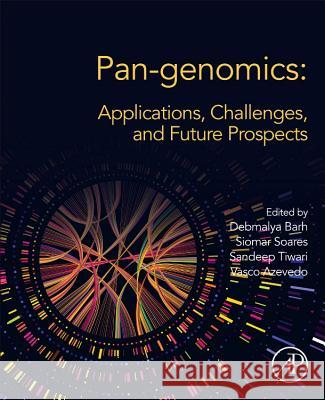Pan-Genomics: Applications, Challenges, and Future Prospects » książka



Pan-Genomics: Applications, Challenges, and Future Prospects
ISBN-13: 9780128170762 / Angielski
Pan-Genomics: Applications, Challenges, and Future Prospects
ISBN-13: 9780128170762 / Angielski
(netto: 657,69 VAT: 5%)
Najniższa cena z 30 dni: 682,14
ok. 30 dni roboczych.
Darmowa dostawa!
1. Overview, applications, and future perspectives of Pan-genomics2. Bioinformatics approaches applied in Pan-genomics and their challenges 3. Evolutionary pan-genomics and applications4. Insights into old and new enemies: Pan-genomics of Corynebacterium diphtheriae and Corynebacterium ulcerans5. Pan-genomics of Veterinary pathogens: Corynebacterium psedotuberculosis 6. Pan-genomics of Plant pathogens and its applications7. Pan-genomics food pathogens and its applications8. Pan-genomics of aquatic animal pathogens and its applications9. Pan-genomics of model bacteria and their outcomes 10. Pan-genomics of multi drug-resistant human pathogenic bacteria and their resistome11. Pan-genomics of Virus and its applications12. Pan-genomics of Fungi and its applications13. Pan-genomics of Algae and applications 14. Pan-genomics of Plants and its applications15. Pan-cancer analysis and applications 16. Reverse vaccinology and drug target identification through Pan-genomics 17. Pan-metagenomics and its applications18. Pan-transcriptomics and its applications19. Pan-proteomics and its applications20. Pan-metabolomics and its applications 21. Pan-interactomics and its applications
Dr. Debmalya Barh is the Founder and Principal Scientist of Institute of Integrative Omics and Applied Biotechnology (IIOAB), INDIA. He is having 15+ years leading academic, healthcare, molecular diagnostic, and bioinformatics industry experience and an expert in integrative omics-based biomarkers, targets and targeted drug discovery, and personalized medicine in cancers and various complex diseases. He works with more than 400 scientists from 100+ top ranked organizations across 40+ countries and has 220+ publications and a branded editor for 10+ cutting-edge omics related reference books. He is a reviewer of journals from Nature publications, Elsevier and AACR Journals, CMAJ, NAR, Molecular Medicine, Gene Therapy, BMC Series, Bioinformatics, PLOS etc. Due to his significant contribution in the field; he has been recognized by Who's Who in the World and Limca Book of Records. Dr Soares holds a degree in Biomedicine, with special training in Bioinformatics, Master's Degree and PhD in Genetics by Federal University of Minas Gerais - UFMG, the latter with one year of study at the Center for Biotechnology (CeBiTec), Universität Bielefeld. He holds a Post-doctorate in Bioinformatics by UFMG. He was Senior Researcher Bioinformatics at the Central Official Laboratory of the Brazilian Ministry of Fisheries and Aquaculture (2014-2015). He is currently Professor at Federal University of the Triângulo Mineiro (UFTM) since 2015, Secretary of the Southeastern regional of the Brazilian Society of Genetics (2017-current), Substitute Coordinator of the undergraduate course in Biomedicine at UFTM (2017-current) and Substitute Research and Technology Development Coordinator of UFTM (2017-current). His research interests are molecular genetics, genomic sequencing and comparative genomics of microorganisms, focusing on pan-genomics, genomic plasticity in the identification of islands of pathogenicity and virulence factors, phylogenomics, molecular epidemiology, reverse vaccination and software development. Dr. Tiwari obtained his BSc from Deen Dayal Upadhyaya Gorakhpur University, MSc in Bioinformatics from Devi Ahilya University, and PhD in Bioinformatics from Department of Genetics, Ecology and Evolution, Federal University of Minas Gerais, Brazil. He is Guest Associate Editorial Board of Frontier in Genetics and frequently serves as an external reviewer for PeerJ and Frontiers. His main areas of expertise are molecular genetics, genomic sequencing and comparative genomics of microorganisms, with a focus on pan-genomics, genomic plasticity in the identification of pathogenicity islands and virulence factors for drug discovery, phylogenomic, molecular epidemiology, reverse vaccinology, and immunoinformatic. Dr. Vasco Azevedo is a full professor at the Department of Genetics, Ecology, and Evolution, Institute of Biological Sciences, Federal University of Minas Gerais, Brazil. He is a CNPq (Conselho Nacional de Desenvolvimento Científico e Tecnológico) researcher 1A, member of the Brazilian Academy of Sciences, Commander of the Order of Scientific Merit of the MCTI of the genetics advisory committee and the public policy working group on biotechnology and genetic resources of COBRG/CNPq, coordinator of the Associated International Laboratory Bactinfl from INRAE and UFMG, and vice-president of the Brazilian Association of Bioinformatics and Computational Biology. He holds a degree in veterinary medicine from the School of Veterinary Medicine of the Federal University of Bahia (1986), a master's degree (1989), a doctorate (1993) in the genetics of microorganisms from the Institut National Agronomique Paris Grignon, and a doctorate in bioinformatics from UFMG (2017). He did his postdoctorate work with the Department of Microbiology, School of Medicine, University of Pennsylvania, United States (1994). He was a professor at the Institute of Biomedical Sciences of the University of São Paulo (2004). He is an expert in genetics and bioinformatics and his work mainly focuses on genomics, transcriptomics, proteomics, metabolomics, vaccine development, diagnostics, and the development of next generation probiotics. He has more than 600 scientific publications, 14 books, and 60 chapters as well as 12 patents.
1997-2026 DolnySlask.com Agencja Internetowa
KrainaKsiazek.PL - Księgarnia Internetowa









